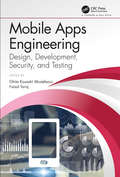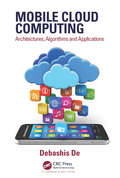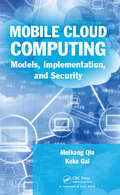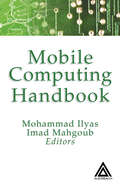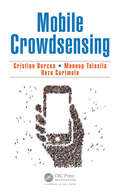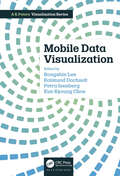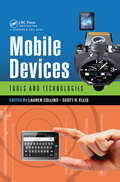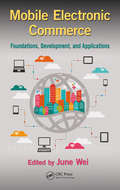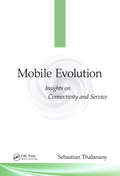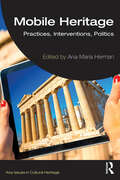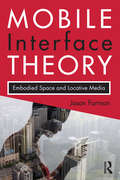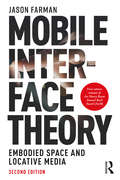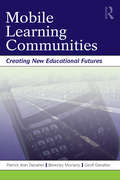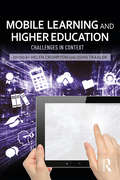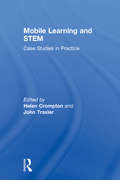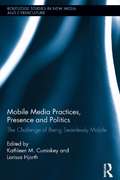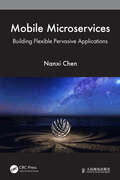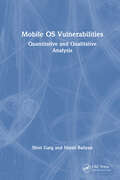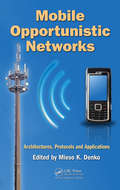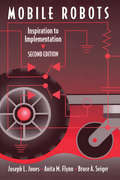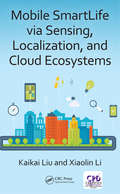- Table View
- List View
Mobile Apps Engineering: Design, Development, Security, and Testing
by Ghita Kouadri Mostefaoui and Faisal TariqThe objective of this edited book is to gather best practices in the development and management of mobile apps projects. Mobile Apps Engineering aims to provide software engineering lecturers, students and researchers of mobile computing a starting point for developing successful mobile apps. To achieve these objectives, the book’s contributors emphasize the essential concepts of the field, such as apps design, testing and security, with the intention of offering a compact, self-contained book which shall stimulate further research interest in the topic. The editors hope and believe that their efforts in bringing this book together can make mobile apps engineering an independent discipline inspired by traditional software engineering, but taking into account the new challenges posed by mobile computing.
Mobile Cloud Computing: Architectures, Algorithms and Applications
by Debashis DeMinimize Power Consumption and Enhance User ExperienceEssential for high-speed fifth-generation mobile networks, mobile cloud computing (MCC) integrates the power of cloud data centers with the portability of mobile computing devices. Mobile Cloud Computing: Architectures, Algorithms and Applications covers the latest technological and architectura
Mobile Cloud Computing: Models, Implementation, and Security
by Meikang Qiu Keke GaiMobile Cloud Computing: Models, Implementation, and Security provides a comprehensive introduction to mobile cloud computing, including key concepts, models, and relevant applications. The book focuses on novel and advanced algorithms, as well as mobile app development. <P><P>The book begins with an overview of mobile cloud computing concepts, models, and service deployments, as well as specific cloud service models. It continues with the basic mechanisms and principles of mobile computing, as well as virtualization techniques. The book also introduces mobile cloud computing architecture, design, key techniques, and challenges. <P><P>The second part of the book covers optimizations of data processing and storage in mobile clouds, including performance and green clouds. The crucial optimization algorithm in mobile cloud computing is also explored, along with big data and service computing. <P><P>Security issues in mobile cloud computing are covered in-depth, including a brief introduction to security and privacy issues and threats, as well as privacy protection techniques in mobile systems. The last part of the book features the integration of service-oriented architecture with mobile cloud computing. It discusses web service specifications related to implementations of mobile cloud computing. <P><P>The book not only presents critical concepts in mobile cloud systems, but also drives readers to deeper research, through open discussion questions. Practical case studies are also included. Suitable for graduate students and professionals, this book provides a detailed and timely overview of mobile cloud computing for a broad range of readers.
Mobile Computing Handbook
by Mohammad Ilyas Imad MahgoubThe debut of small, inexpensive, yet powerful portable computers has coincided with the exponential growth of the Internet, making it possible to access computing resources and information at nearly any location at almost any time. This new trend, mobile computing, is poised to become the main technology driver for a decade to come. There are many
Mobile Crowdsensing
by Cristian Borcea Manoop Talasila Reza CurtmolaMobile crowdsensing is a technology that allows large scale, cost-effective sensing of the physical world. In mobile crowdsensing, mobile personal devices such as smart phones or smart watches come equipped with a variety of sensors that can be leveraged to collect data related to environment, transportation, healthcare, safety and so on. This book presents the first extensive coverage of mobile crowdsensing, with examples and insights drawn from the authors’ extensive research on this topic as well as from the research and development of a growing community of researchers and practitioners working in this emerging field. Throughout the text, the authors provide the reader with various examples of crowdsensing applications and the building blocks to creating the necessary infrastructure, explore the related concepts of mobile sensing and crowdsourcing, and examine security and privacy issues introduced by mobile crowdsensing platforms. Provides a comprehensive description of mobile crowdsensing, a one-stop shop for all relevant issues pertaining to mobile crowdsensing, including motivation, applications, design and implementation, incentive mechanisms, and reliability and privacy. Describes the design and implementations of mobile crowdsensing platforms of great interest for the readers working in research and industry to quickly implement and test their systems. Identifies potential issues in building such mobile crowdsensing applications to ensure their usability in real life and presents future directions in mobile crowdsensing by emphasizing the open problems that have to be addressed.
Mobile Data Visualization (AK Peters Visualization Series)
by Bongshin LeeMobile Data Visualization is about facilitating access to and understanding of data on mobile devices. Wearable trackers, mobile phones, and tablets are used by millions of people each day to read weather maps, financial charts, or personal health meters. What is required to create effective visualizations for mobile devices? This book introduces key concepts of mobile data visualization and discusses opportunities and challenges from both research and practical perspectives. Mobile Data Visualization is the first book to provide an overview of how to effectively visualize, analyze, and communicate data on mobile devices. Drawing from the expertise, research, and experience of an international range of academics and practitioners from across the domains of Visualization, Human Computer Interaction, and Ubiquitous Computing, the book explores the challenges of mobile visualization and explains how it differs from traditional data visualization. It highlights opportunities for reaching new audiences with engaging, interactive, and compelling mobile content. In nine chapters, this book presents interesting perspectives on mobile data visualization including: how to characterize and classify mobile visualizations; how to interact with them while on the go and with limited attention spans; how to adapt them to various mobile contexts; specific methods on how to design and evaluate them; reflections on privacy, ethical and other challenges, as well as an outlook to a future of ubiquitous visualization. This accessible book is a valuable and rich resource for visualization designers, practitioners, researchers, and students alike.
Mobile Devices and Technology in Higher Education: Considerations for Students, Teachers, and Administrators (NCA Focus on Communication Studies)
by Scott Titsworth Jeffrey H. Kuznekoff Stevie M. MunzThis book examines key issues at the intersection of education and technology by addressing the question that most educators face—how do we use technology to engage students in the learning process and enhance learning? Problematizing the view that technology is the default solution to a host of problems facing education, while also recognizing that technology has an important place in a variety of education levels, the book provides readers with clear insights on technology and learning from a variety of perspectives from communication studies, education, and related disciplines. This volume is an essential read for scholars and teachers working in the area of elementary education. It will also be of interest to academics working in the area of education, postsecondary education, and learning and can be used as an ancillary text in graduate-level seminars.
Mobile Devices: Tools and Technologies
by Lauren Collins Scott R. EllisThis book provides readers at all levels of technical expertise with an understanding of mobile device concepts, application development processes, networking and infrastructure, and security methods. In chapters contributed by engineers with extensive real-world experience in the mobile and wireless field, the book offers insights into the tools and technologies critical to evaluating and implementing mobile strategies. The contributors illustrate proven best practices and methodologies using real-world case studies drawn from their extensive experiences with mobile software and infrastructures for enterprise customers.
Mobile Electronic Commerce: Foundations, Development, and Applications
by June WeiMobile commerce transactions continue to soar, driven largely by the ever-increasing use of smartphones and tablets. This book addresses the role of industry, academia, scientists, engineers, professionals, and students in developing innovative new mobile commerce technologies. It also discusses the impact of mobile commerce on society, economics, culture, organizations, government, industry, and our daily lives. This book brings together experts from multiple disciplines in industry and academia to stimulate new thinking in the development of mobile commerce technology.
Mobile Enterprise Transition and Management (Advanced & Emerging Communications Technologies)
by Bhuvan UnhelkarAddressing the rapid evolution of global communications, this book provides step-by-step guidance on how to configure, enact, and manage the process of integrating mobile technology within an organization. The mobile enterprise transition (MET) process presented considers input from the four significant dimensions of an organization - economic, technical, process, and social - making it a well-rounded and complete process. Based on extensive research, literature review, and practical experimentation, this comprehensive text presents emerging best practices, exhaustive case studies, and examples of successful transitions. It also provides detailed references, and a glossary of key terms and commonly used acronyms.
Mobile Evolution: Insights on Connectivity and Service
by Sebastian ThalananyThis book presents insights, interpretations, concepts, and interdependent views-in the landscape of mobile connectivity and service-that emphasize the significance of a harmonious interplay, cooperation, and coalescing of a variety of interdisciplinary domains of science and art. Mobile Evolution: Insights on Connectivity and Service explores the forward-looking and enabling capabilities of mobile connectivity and service in the context of long term evolution (LTE) systems and multimedia services, as viewed through a lens of human experience. It provides information and guidelines pertaining to the strategies and technologies associated with the next-generation mobile ecosystem.
Mobile Heritage: Practices, Interventions, Politics (Key Issues in Cultural Heritage)
by Ana-Maria HermanMobile Heritage explores how diverse digital technologies (such as apps, GPS, games, social platforms, NFTs, drones, AR, MR and AI, among others) have allowed for new types of mobilities and introduced a novel set of practices, interventions, and politics for heritage collections, archives, exhibitions, entertainment, conservation, management, commerce, education, restitution, activism, and regulation.The volume is not a ‘how to’ book. Instead, it critically examines this emerging landscape and its unsettling of existing relations between heritage and knowledge, value, identity, power, sense of place, community, nationhood, and ownership – thus outlining a new set of issues, implications, and consequences. The volume brings together case studies from around the world and each chapter considers mobility matters associated with tangible and intangible cultural heritage (relating to art, film, music, games, manuscripts, traditional knowledge, architecture, cities, and more) and the involvement of a variety of actors in digital heritage practices and interventions (such as artists, activists, communities, museums, non-profit organisations, educational institutions, enterprises and governmental agencies). The contributors are scholars and practitioners drawing on various disciplines and fields of study, including archaeology, museum studies, media studies, computing, art history, cultural studies, anthropology, gender studies, mobility studies, and law.Mobile Heritage positions mobility as a critical tool for understanding the changing (digital) heritage landscape, making this volume an essential read for students, academics, and practitioners engaged in this area.
Mobile Interface Theory: Embodied Space and Locative Media
by Jason FarmanMobile media – from mobile phones to smartphones to netbooks – are transforming our daily lives. We communicate, we locate, we network, we play, and much more using our mobile devices. In Mobile Interface Theory, Jason Farman demonstrates how the worldwide adoption of mobile technologies is causing a reexamination of the core ideas about what it means to live our everyday lives. He argues that mobile media’s pervasive computing model, which allows users to connect and interact with the internet while moving across a wide variety of locations, has produced a new sense of self among users – a new embodied identity that stems from virtual space and material space regularly enhancing, cooperating or disrupting each other. Exploring a range of mobile media practices – including mobile maps and GPS technologies, location-aware social networks, urban and alternate reality games that use mobile devices, performance art, and storytelling projects – Farman illustrates how mobile technologies are changing the ways we produce lived, embodied spaces.
Mobile Interface Theory: Embodied Space and Locative Media
by Jason FarmanIn this updated second edition, Jason Farman offers a groundbreaking look at how location-aware mobile technologies are radically shifting our sense of identity, community, and place-making practices. Mobile Interface Theory is a foundational book in mobile media studies, with the first edition winning the Book of the Year Award from the Association of Internet Researchers. It explores a range of mobile media practices from interface design to maps, AR/VR, mobile games, performances that use mobile devices, and mobile storytelling projects. Throughout, Farman provides readers with a rich theoretical framework to understand the ever-transforming landscape of mobile media and how they shape our bodily practices in the spaces we move through. This fully updated second edition features updated examples throughout, reflecting the shifts in mobile technology. This is the ideal text for those studying mobile media, social media, digital media, and mobile storytelling.
Mobile Learning Communities: Creating New Educational Futures
by Geoff Danaher Patrick Alan Danaher Beverley MoriartyMobile Learning Communities explores the diverse ways in which traveling groups experience learning ‘on the run’. This book provides empirical evidence that draws on the authors’ 17 years of continuing research with international occupational Travelers. It engages with themes such as workplace learning, globalization, multiliteracies, and emerging technologies which impinge on the ways mobile groups make sense of themselves as learning communities. International in focus, this book deals with an issue of increasing global significance and shows the complexities of the lives and learning experiences of such mobile cultures and their strategies for earning, learning, and living, thus challenging simplistic and stereotypical images of traveling groups still found in mainstream media and popular culture. Mobile Learning Communities brings together for the first time mobilities and learning communities into a single and comprehensive focus. It provides a detailed analysis of how mobile groups position themselves and how they are positioned by others. This text will appeal to scholars in the field of distance education and educational technology and to researchers in education, cultural studies, and sociology. It will also be of interest to educational instructors, policy-makers, and administrators, as well as teacher educators and pre-service teachers. It paints a vivid picture of the experience of mobility through the words of the mobile learners themselves, but also critiques existing notions of learning and suggests ways of creating new educational futures for all learners and educators.
Mobile Learning and Higher Education: Challenges in Context
by Helen Crompton John TraxlerMobile Learning and Higher Education provides case studies of mobile learning in higher education settings to showcase how devices can transform learning at the undergraduate and graduate levels. With the rapid diffusion of networked technologies among the adult populations of many countries and the supersession of the once-ubiquitous lecture approach with active learner-centered teaching for deep understanding, mobile devices are increasingly used in higher education classrooms to offer unique and effective new approaches to teaching and learning. A cutting-edge research volume, this collection also provides a springboard for building better practices in higher education institutions.
Mobile Learning and STEM: Case Studies in Practice
by Helen Crompton John TraxlerIn recent years, there has been a renewed focus on STEM education in the United States, fueled by evidence that young learners’ competencies in science, technology, engineering, and mathematics are falling behind those of their global peers. Scholars and practitioners are beginning to utilize the new pedagogical opportunities offered by mobile learning to improve the successes of teachers and K-12 students across STEM subjects. Mobile Learning and STEM: Case Studies in Practice is a comprehensive collection of case studies that explore mobile learning’s support of STEM subjects and that utilize mobile technology to facilitate unique and effective K-12 teaching and learning experiences. In addition to its focus on STEM achievement for researchers, this volume is a resource for teachers working to implement mobile learning initiatives into their classrooms. Mobile Learning and STEM also includes research that is applicable to classrooms in nations around the world, where few students from underrepresented racial and socioeconomic backgrounds are entering into STEM jobs. Concluding with a summary of its research and its implications to future scholarship and practice, this book is a springboard for practitioners, specialists, higher education instructors, and researchers who want to establish better practices in schools and raise student achievement in STEM subjects.
Mobile Learning: A Handbook for Educators and Trainers (Open And Flexible Learning Ser.)
by Agnes Kukulska-Hulme John TraxlerEmphasising the issues of usability, accessibility, evaluation and effectiveness and illustrated by case studies drawn from contemporary projects from around the world, this book considers: the fundamentals of mobile technologies and devices the educational foundations of modern networked learning the issues that underpin mobile learning and make it accessible for all users the challenges of making mobile learning a substantial and sustainable component in colleges, universities and corporations implications and issues for the future. Mobile Learning provides useful, authoritative and comprehensive guidance for professionals in higher and further education and trainers in the business sector who want to find out about the opportunities offered by new technologies to deliver, support and enhance teaching, learning and training.
Mobile Media Practices, Presence and Politics: The Challenge of Being Seamlessly Mobile (Routledge Studies in New Media and Cyberculture)
by Larissa Hjorth Kathleen M. CumiskeyAs an example of convergence, the mobile phone—especially in the form of smartphone—is now ushering in new promises of seamlessness between engagement with technology and everyday common experiences. This seamlessness is not only about how one transitions between the worlds of the device and the physical environment but it also captures the transition and convergences between devices as well (i.e. laptop to smartphone, smartphone to tablet). This volume argues, however, that these transitions are far from seamless. We see divisions between online and offline, virtual and actual, here and there, taking on different cartographies, emergent forms of seams. It is these seams that this volume acknowledges, challenges and explores—socially, culturally, technologically and historically—as we move to a deeper understanding of the role and impact of mobile communication’s saturation throughout the world.
Mobile Media: Content and Services for Wireless Communications (European Institute for the Media Series)
by Eli M. Noam Jo Groebel Valerie FeldmannThe proliferation of mobile media in recent years is an international phenomenon, with billions of devices sold annually. Mobile communications are now moving beyond individualized voice to mass media content--text, voice, sound, images, and even video. This will create new types of content that allow media companies and users to interact in new ways. There is a strong interest from the media and telecom industries in what manner of applications and content can be distributed in that fashion, and at what cost. To answer these questions, the book provides 18 chapters from internationally renowned authors. They identify likely types of content such as news, entertainment, peer-to-peer, and location-specific information; evaluate the economics, business models, and payment mechanisms necessary to support these media; and cover policy dimensions such as copyright, competitiveness, and access rights for content providers.This volume takes the reader through the various elements that need to be considered in the development of third generation (3G) content, and explains pitfalls and barriers. The result is a volume of interest to business professionals, academics, and policy makers.The book is international in focus and a glossary of terms is provided. There are few publications available which give an overview of this rapidly changing field.
Mobile Microservices: Building Flexible Pervasive Applications
by Nanxi ChenIn the 5G era, edge computing and new ecosystems of mobile microservices enable new business models, strategies, and competitive advantage. Focusing on microservices, this book introduces the essential concepts, technologies, and trade-offs in the edge computing architectural stack, providing for widespread adoption and dissemination. The book elucidates the concepts, architectures, well-defined building blocks, and prototypes for mobile microservice platforms and pervasive application development, as well as the implementation and configuration of service middleware and AI-based microservices. A goal-oriented service composition model is then proposed by the author, allowing for an economic assessment of connected, smart mobile services. Based on this model, costs can be minimized through statistical workload aggregation effects or backhaul data transport reduction, and customer experience and safety can be enhanced through reduced response times. This title will be a useful guide for students and IT professionals to get started with microservices and when studying the use of microservices in pervasive applications. It will also appeal to researchers and students studying software architecture and service-oriented computing, and especially those interested in edge computing, pervasive computing, the Internet of Things, and mobile microservices.
Mobile OS Vulnerabilities: Quantitative and Qualitative Analysis
by Niyati Baliyan Shivi GargThis is book offers in-depth analysis of security vulnerabilities in different mobile operating systems. It provides methodology and solutions for handling Android malware and vulnerabilities and transfers the latest knowledge in machine learning and deep learning models towards this end. Further, it presents a comprehensive analysis of software vulnerabilities based on different technical parameters such as causes, severity, techniques, and software systems’ type. Moreover, the book also presents the current state of the art in the domain of software threats and vulnerabilities. This would help analyze various threats that a system could face, and subsequently, it could guide the securityengineer to take proactive and cost-effective countermeasures. Security threats are escalating exponentially, thus posing a serious challenge to mobile platforms. Android and iOS are prominent due to their enhanced capabilities and popularity among users. Therefore, it is important to compare these two mobile platforms based on security aspects. Android proved to be more vulnerable compared to iOS. The malicious apps can cause severe repercussions such as privacy leaks, app crashes, financial losses (caused by malware triggered premium rate SMSs), arbitrary code installation, etc. Hence, Android security is a major concern amongst researchers as seen in the last few years. This book provides an exhaustive review of all the existing approaches in a structured format. The book also focuses on the detection of malicious applications that compromise users' security and privacy, the detection performance of the different program analysis approach, and the influence of different input generators during static and dynamic analysis on detection performance. This book presents a novel method using an ensemble classifier scheme for detecting malicious applications, which is less susceptible to the evolution of the Android ecosystem and malware compared to previous methods. The book also introduces an ensemble multi-class classifier scheme to classify malware into known families. Furthermore, we propose a novel framework of mapping malware to vulnerabilities exploited using Android malware’s behavior reports leveraging pre-trained language models and deep learning techniques. The mapped vulnerabilities can then be assessed on confidentiality, integrity, and availability on different Android components and sub-systems, and different layers.
Mobile Opportunistic Networks: Architectures, Protocols and Applications
by Mieso K. DenkoFrom fundamentals to advanced concepts, this book provides comprehensive technical coverage of this rapidly emerging communications technology. The first section focuses on modeling, networking architecture, and routing problems. The second section examines opportunistic networking technologies and applications. Supplying detailed discussions of key research challenges and open issues, this comprehensive resource provides a clear understanding of industrial and professional standards, communication architectures, network algorithms and protocols, emerging applications, and the latest experimental studies-including simulation tools and implementation test beds.
Mobile Robots: Inspiration to Implementation, Second Edition
by Joseph L. Jones Bruce A. Seiger Anita M. FlynnRevised and updated, the second edition includes several new chapters with projects and applications. The authors keep pace with the ever-growing and rapidly expanding field of robotics. The new edition reflects technological developments and includes programs and activities for robot enthusiasts. Using photographs, illustrations, and informative t
Mobile SmartLife via Sensing, Localization, and Cloud Ecosystems
by Xiaolin Li Kaikai LiuIndoor location is one of the two most important contexts (time and location), becoming a key entry for mobile Internet. This book envisions potential indoor location applications, overviews the related state of the art technologies, and presents original patented techniques and open source prototype systems. The tutorial and sample code are provided as a good reference and starting point for readers who are interested in the technique detail.
